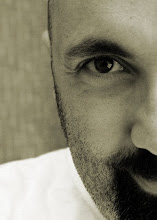The plot weaves together the dual stories of one man's tragic fall from power, grace and, eventually, life with the greater story of the collapse of the tribal culture and tradition under the weight of aggressive, European influence and law brought by missionaries to Nigeria.
Okonkwo is a man haunted by the memory of his father, a man considered a failure in the male dominated culture of the Ibo people in Umuofia, a clan of villages in Nigeria. Okonkwo's father didn't work, had no wealth and lived his life playing the flute and sponging off others. He died alone in the forest. Okonkwo fears, more than anything else, being compared in any way to his father. In his quest he shows great strength in battle and in wrestling and he rules his family and wives as he believes a patriarch should - without showing love or affection.

My dear friend Yomi A. Michaels played the role of Okonkwo in a touring version of the stage adaptation of Things Fall Apart by Biyi Bandele. He was fortunate enough to travel to the land of his parents, Nigeria, to perform in Lagos. His parents were both Yoruba which meant that he had his own internal conflicts in portraying an Ibo man. Yomi also had the honour of meeting Achebe himself in Nigeria - a meeting that deeply moved him. As Yomi wrote on the BBC World Services "My Century" in 1999,
"Nigerians view Chinua Achebe with immense pride - particularly the Ibo people, of course, but Nigeria as a whole feels great pride that he was born a Nigerian."
After Things Fall Apart, Yomi went on to play the role of King Baabu written by another Nigerian literary great Wole Soyinka. Soyinka was born into a Yoruba family in 1934 and studied in Nigeria and then the University of Leeds, England, Yomi's home town. Soyinka won the Nobel Prize in Literature in 1986, the first African to be awarded the prize. Yomi always felt a strong connection to Soyinka and referred to him, affectionately, as 'the Prof'.

Yomi A. Michaels, in red, takes the curtain as King Baabu in Lesotho. (pic. M.Kheleli)
Yomi died, suddenly, in March of 2006, in London, at the age of 41. The last time I saw him was in London in February of 2006. Since I'd moved to Paris we had seen less of each other but we stayed in touch and he'd been out to visit. We always connected when I returned to London on business. That final time we celebrated my upcoming move to California. We plotted cross country road trips. We talked about meeting in New York and going to see his beloved Yankees play at Yankee Stadium. We walked through Soho - our area - on the way back to my hotel. We stopped outside of the Apple store on Regent Street and he wanted to take a picture of me to commemorate my new job and the move to Apple headquarters.
It's funny how extraordinary things happen on very ordinary days. I was home one day when I took a call from someone I'd only spoken to a couple of times before. She told me that Yomi was dead. I traveled back to England to attend the funeral and give a eulogy. His family asked me if I could pull anything of interest - writings, pictures and such - from his laptop and digital camera. The very last picture on his digital camera was the one he'd took of me outside the Apple Store. I felt like I could see his ghost in the reflected flash from his camera.

So, tonight, I was in a bookstore and saw, again, a copy of Things Fall Apart. I picked it up and looked at it and thought of my friend. I replaced it on the shelf and continued looking. The next book I picked up was 'Off Mike' by Michael Krasny, the host of KQED's Forum and someone I enjoy listening to on NPR. The book fell open in my hands at page 170. Which just happened to be the page where Krasny talks of interviewing Wole Soyinka, the author of King Baabu and the man my friend always referred to as 'the Prof'.
I bought both books.

3 comments:
One of my favorite novels we were required to read in high school.
Wonderful story...there are too many wonderous things that happen in life for them all to be coincidences...maybe I'll check out the book.
Thank you for sharing that story. Makes you wonder what kind of legacy we will leave behind.
Post a Comment